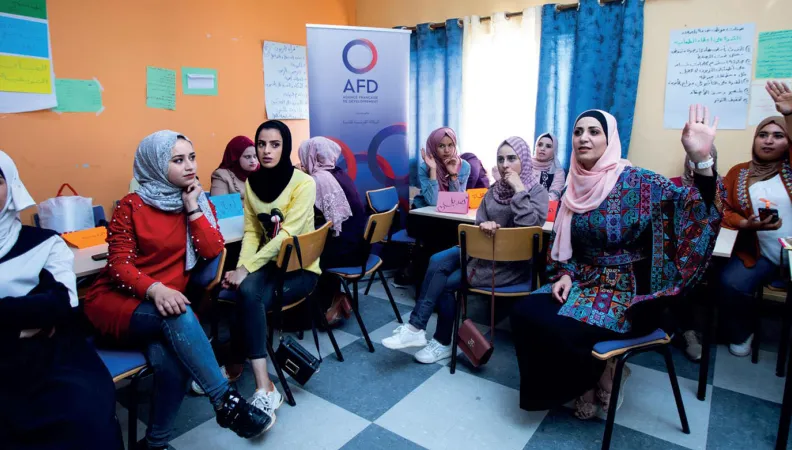Share the page
Amal – Hope: Bringing hope through jobs for young Jordanians and Syrian refugees
Project


-
Project start date
-
Status
Ongoing
-
AFD financing amount
-
€ 2 500 000
-
Country and region
-
Location
-
Amman, Irbid, Mafraq, Ajloun and Jerash
-
Type of financing
-
Beneficiaries
-
Jordan Education for Employment (JEFE)
Directly support 1,350 young Jordanians and Syrian refugees to increase their employability and help them become economically empowered through market-driven training, job placement and entrepreneurship.
Contexte
In Jordan unemployment is high among youth (36%), with over 75% of the population being under 35. Young female unemployment is particularly striking at 56.5%. The COVID-19 pandemic began to jeopardize the global economy, aggravating youth unemployment, which reached nearly 50% in end 2020. Job creation and lack of income-generating opportunities for youth are two of the most pressing socio-economic issues facing Jordan, particularly for women and vulnerable youth such as refugees.
Jordan’s economic outlook is further complicated by the influx of over 1.3 million refugees, representing over 13% of the total population. Women and refugees face several challenges in accessing employment since social norms, stereotypes and prejudices negatively impact employers’ assumptions.
Conversely, private-sector employers continuously report difficulties in hiring work-ready employees for jobs that are already available, citing mainly inadequate technical, soft or life skills as barriers. If provided with the right skills, young Jordanians and Syrian refugees could access the job market and become productive employees and business owners, contributing to boost economic growth and concomitant job creation.
Descriptif
Through a 3-track methodology – Improvement of Employability (IE), Job Training and Placement (JTP), and Micro-Entrepreneurship (ME), the project AMAL (Hope) will:
- Directly improve the employability of 360 unemployed young Jordanians through online soft-skills training via an e-learning platform designed together with Accenture;
- Directly support 675 underprivileged, unemployed young Syrian refugees and Jordanians (495 Syrian refugees and 180 Jordanians) in accessing high-quality, formal employment; and
- Directly support 315 underprivileged, unemployed young female Jordanians in creating their own businesses.
The implementation of trainings was dedicated to the hospitality sector in Jordan, but the COVID-19 pandemic had a strong negative impact on that sector which added an extra layer of challenges, and the need for change becomes necessary. The new methodology proposal includes activities under Track 2: Job Training and Placement (for Syrian beneficiaries) to be trained to work in the gig economy as freelancers; while micro-entrepreneurship women benefited from more advanced trainings to empower their small business and capabilities.
Impacts
On the labor market:
- Companies will count on a pool of skilled, qualified, young talent to support their expansion and growth plans, helping them generate more jobs.
- Newly created businesses by female entrepreneurs will grow and generate additional job opportunities.
For beneficiaries (30% including refugees, 50% female) :
- Vulnerable people will be personally, professionally and economically empowered through skills to access to employment opportunities.
- Access to formal job opportunities will be supported for male and female Syrian refugees in Jordan, increasing income for the beneficiaries and their families
- Promoting a positive change in beneficiaries’ attitudes and self-esteem as well as their technical capacities.


